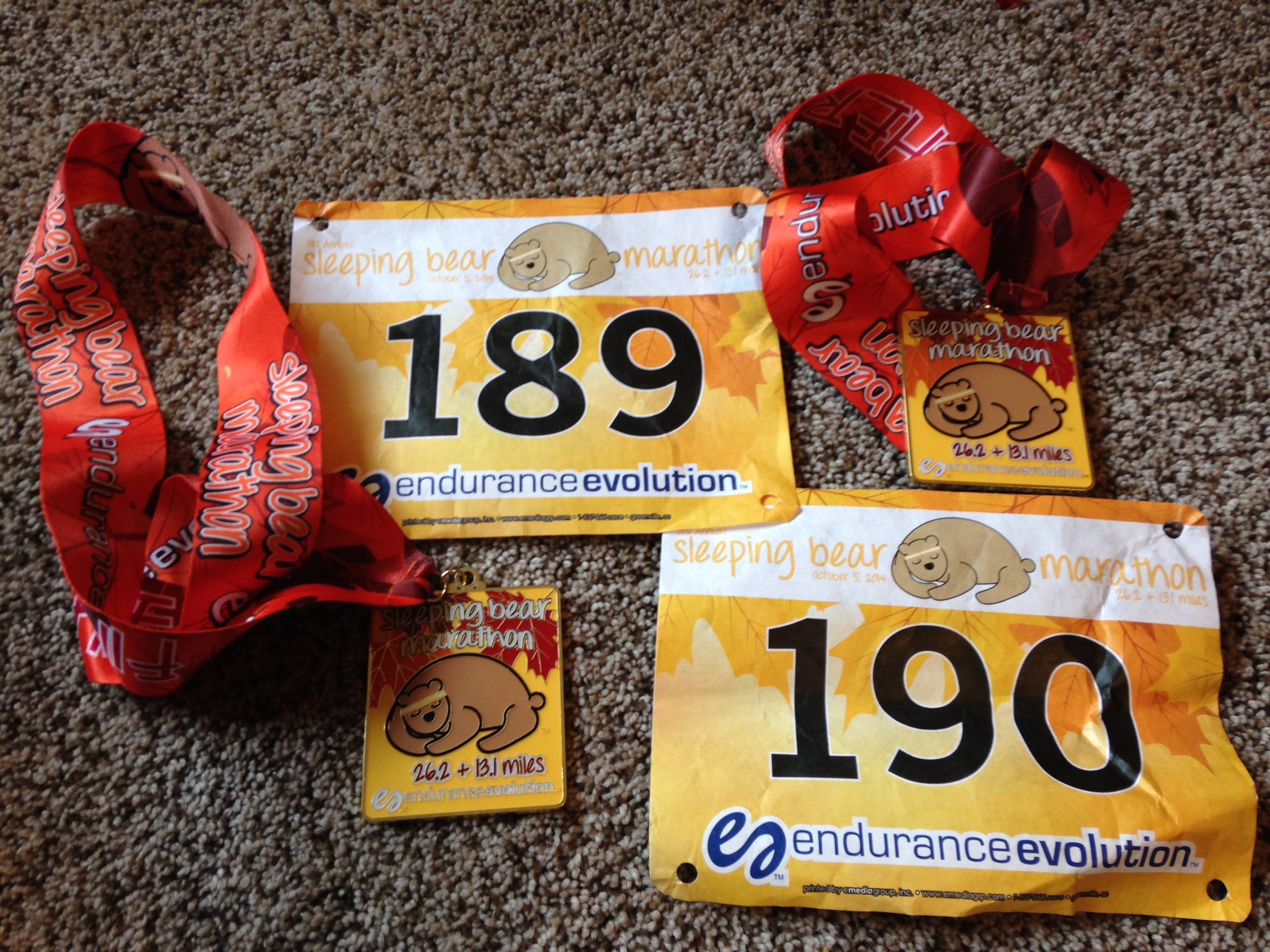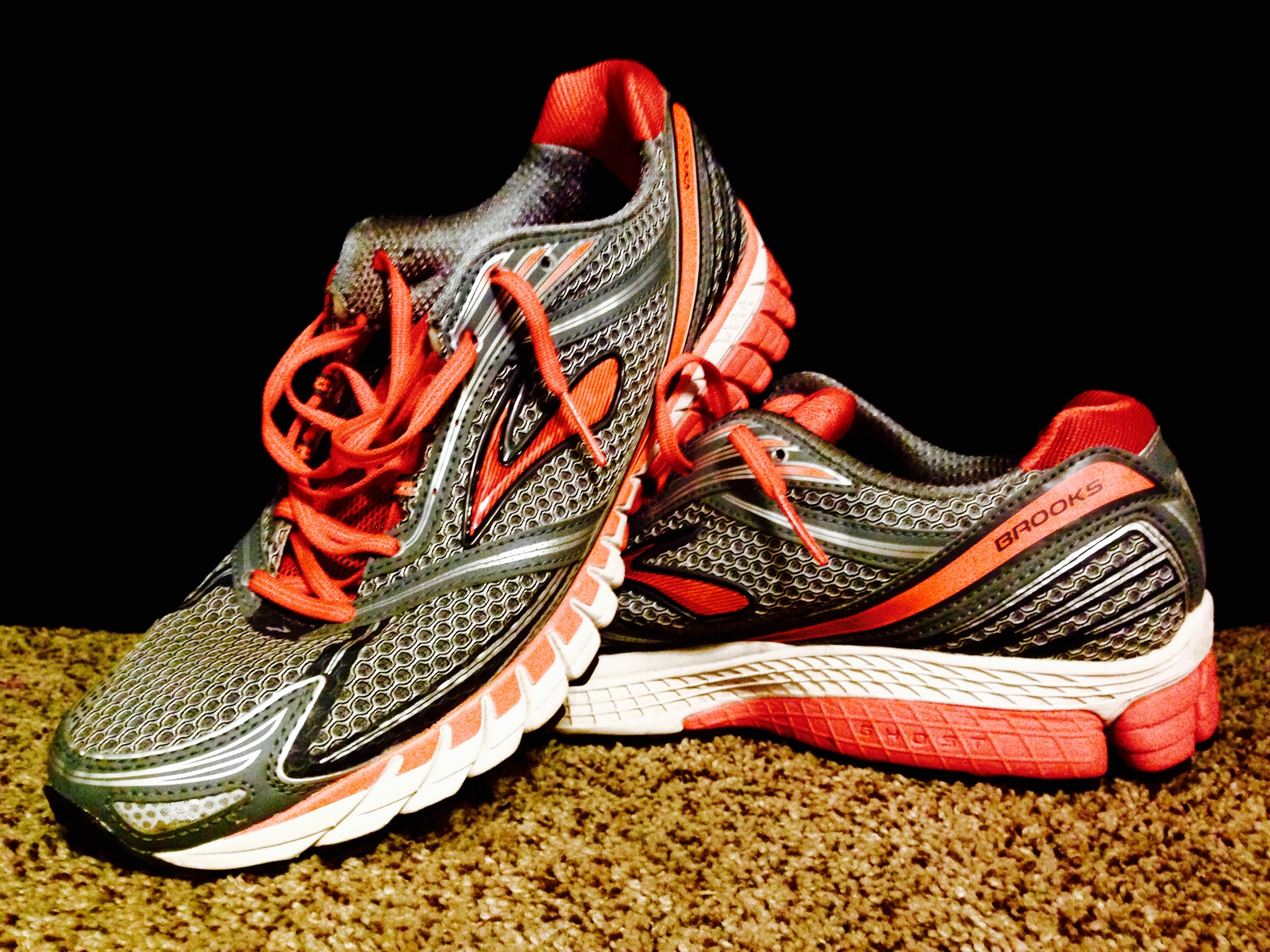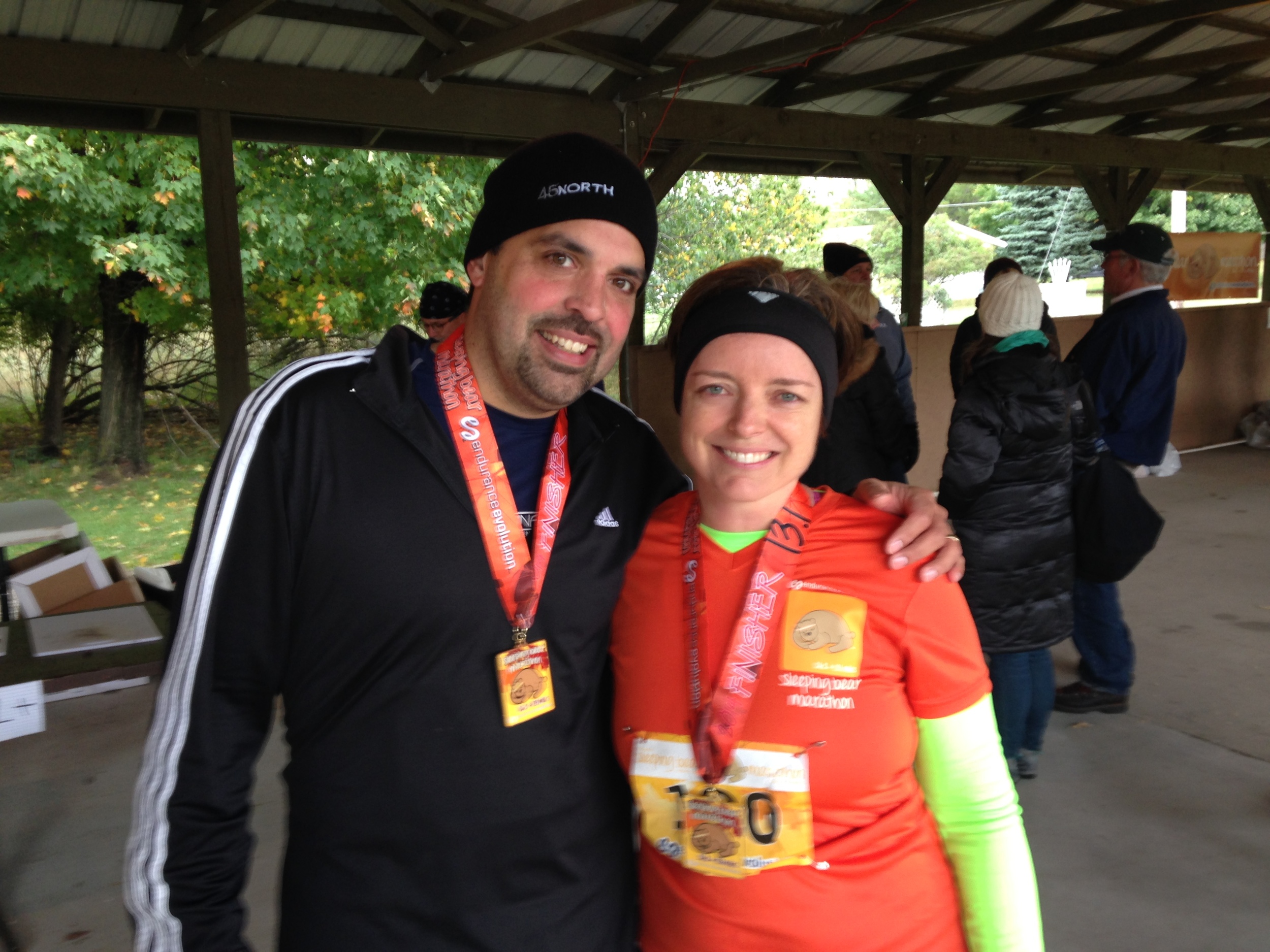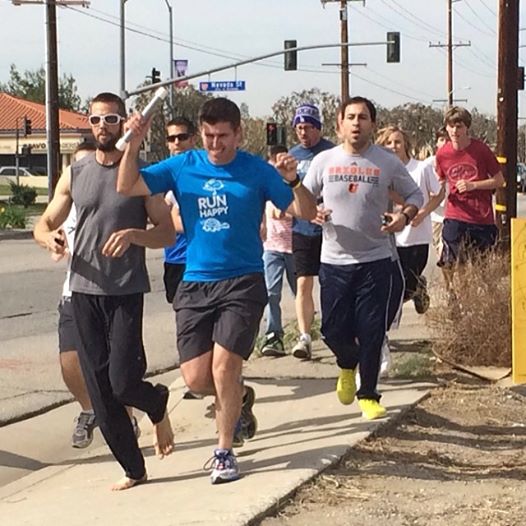In preparation for my first half marathon I’m finding out why I really don’t enjoy running that much: it’s hard. Yes, after several months of running I’m finally breaking thru some barriers, but running is still hard work for me. For example, on almost any given day I can hop outside and run 1.5-2 miles without much pain. But after two miles, my brain starts in on this little game I like to call, “Let’s go home and eat a frozen pizza.”

If my running thoughts were broadcasted, I would be somewhat humiliated. I’d be running by someone’s house and they’d hear, “I wonder if I just ran into that tree in their yard, if they’d call 9-1-1 and I could get a lift home?” Or the other day when a guy stopped his car on the road to ask directions he would have heard, “Yeah, I’ll tell you where the baseball park is if you let me hop on your running boards for the next mile!” The problem with that plan is that the app Map My Run would have shown a split mile time of 45mph and most of you wouldn’t have believed I actually ran that fast. You guys are such skeptics!
The flip side of the hard work though, is the joy -- yes, I just used the word joy describing an aspect of running! -- that comes when you set a personal new distance record or meet a time goal. Just last night Traci and I ran for 4.13 miles, out on the road for over 46 minutes. It was the first time I had run that far (previously I hadn’t run more than 3.57 miles) for that long (42 minutes was my previous time).
I was actually pretty pumped to share that with others, even with my running friends who hit 4.13 miles during their “warm up” runs before the race. There was something profoundly important to me, and thus joy-inducing, when I hit those two marks; it was hard, and the difficulty of it created its own reward.
This half marathon training has really been the perfect metaphor for this year. As I approach the half way point of life (statistically speaking), I feel like I’m just hitting my stride. I’ve worked through the challenges of starting, I’ve climbed a couple of hills and enjoyed coasting down a few slopes, and now I’m in the grind. Now I’m in the part of the run where my mind is looking for shortcuts to the finish line, where I’m wondering why I keep running even though my feet ache and I’m frustrated that I’m being passed by so many other runners who don’t seem to struggle at all.
Part of me is looking back at the course and wishing I had started my training earlier. “If I had done this or that, I would be [insert over-inflated sense of self accomplishment here].” Part of me is looking ahead, knowing some more big hills are coming, and wondering if I’ll have what it takes to run my race to the end.
The writer of Hebrews must have been a long-distance runner, because he understood run psychology. He writes in 12:1-2, “...let us throw off everything and that hinders and the sin that so easily entangles...and let us run with perseverance the race marked out for us. Let us fix our eyes on Jesus, the author and perfecter of our faith...”
I’m learning that distance running requires two traits, and neither of them are physical. The first is sheer grit. You have to run with perseverance. You have to choose to stay on the path, to keep running even when you’re being passed, to commit to holding the course on the hills when your mind is fairly certain you’ve accidentally gotten off course and stumbled upon Mt. Everest. The most athletic people in the world can struggle in distance running simply because of the mental toughness that’s required. While learning to run, I’m learning how mentally un-tough I am, but I’m working on it!
The second trait distance runners need is focus. You have to find a way to engage your mind while you run. I’ve talked to a lot of runners, and they all have great focus, they just focus on different things. I have one friend who just counts his steps and thinks about each stride as his feet pound the pavement. I have another friend who said she spends time creating lists while runs. Shopping lists, to-do lists, honey-do lists...by focusing on the lists, she takes her mind of the distance and runs with more ease. I’ve heard of runners who fix their eyes on a point on the horizon and set mini-goals for reaching those points, and I’ve heard of runners who count spectators or trees and I’ve known some who put on their earbuds and play music, listen to a book or dial up a podcast in an attempt to keep their minds focused while they run.
Running long distances (and I believe anything over two miles is long distance!) effectively, requires perseverance and focus -- two of the same qualities needed when making an Overboard Life. The writer of Hebrews said “run with perseverance” and “fix your eyes on Jesus” to help us get through each of our races. You have to hold the course when things get tough, you have to persevere with laser-like focus so that you can experience the joy of the journey, and the thrill of finishing well.
A few years ago I became mildly obsessed with the story of Ernest Shackleton. He was a great sea captain who was determined to be the first man to plant a flag for his country (England) on the South Pole. He loaded up his ship, The Endurance, and headed south with his crew. His journey is one of the most amazing in exploration history, for what they endured and survived.

After being stopped by ice, everything that could have gone wrong, did. The ship was crushed by ice floes, many of the emergency supplies were lost and the sled dogs became sick and injured. Realizing they were marooned on a floating island of ice, they sought shelter, tried to find another party of travelers (the Germans were also making haste for South Pole fame) and ultimately built an ice-cave “home” where they weathered a horrendous winter as prisoners on the South Pole.
Months after first getting stuck, Shackleton and two other men made a desperate last-gasp attempt to get help at a Norwegian whaling village on a very small, very remote island in the middle of the southern seas. With no navigational equipment except a compass, taking off in what became an absolutely horrendous storm, and riding in a life boat that had been salvaged from the wreck, Shackleton and his two-man crew headed for the island that was like finding a needle in a haystack.
While 20 and 30 foot swells crashed down on them, the clouds blocked out the moon and stars and with the knowledge that being even 1/2 a degree off would mean certain failure and death, they made every adjustment they could to keep the path. Shackleton’s chief navigation officer kept the boat on course. He never let them waiver, even when it meant facing the eye of the storm. And as the clouds finally rolled back, as the storm slowly relented, a when a small beam of moonlight shined down upon calmer waters, Shackleton and his two fellow sailors beheld the most beautiful sight in the world -- the tiny island they had aimed their boat toward.
They had kept the course and the reward was theirs -- Shackleton, and all but one member of his crew, were rescued.
Shackleton and his crew became famous. He would lead a few other expeditions in his day, but ultimately would settle to become a fairly well-known speaker. He would talk about his crew’s hardships, he would share the lessons he learned about leadership and courage, and he would never forget the journey that changed his life (probably more than if he had been the first to the South Pole!).
You and I will experience storms in life. We will have every reason to be derailed and to give up. The clouds will block the sky, the swells will come crashing down and the possibility of hitting the right mark will seem as unlikely as Shackleton and his crew finding a tiny fishing village in the middle of the ocean. And that’s when we must hold the course most of all. That’s when we must run with perseverance and focus, and we must, we must, hold fast.
Jesus didn’t promise us an easy life, He just promised us one that is possible with His help. In Matthew 14, Jesus didn’t call Peter out of the boat onto warm, tropical and calm waters. Instead He called Peter out of the boat in a storm, in the middle of the night, with waves that had been slamming against the boat, and with a wind that was howling -- that’s the environment where Peter was summoned. And I believe that’s the environment where life’s greatest joys, victories, accomplishments and faith-stretching occur. The eleven men who stayed in the boat never experienced the thrill of walking on water, the joy of strolling through the storm and even the rush of being rescued by Jesus. They stayed put.
In the same way, the joy of the victory comes to the runners who finish, not to the spectators who watch, and not to the runners who give up along the way. I’m learning that the speed at which I run is far less important than the perseverance and focus I run with. On a future fall day in October, I don’t think I’m going to be that concerned with how fast I run my first half-marathon, but rather I will be thrilled that I run and that I finish what I set out this year to do.
Are you running the race God has set you on? Are you running with perseverance even in the tough seasons and storms? Are you focused on Jesus, the One who will always supply you with exactly what you need, when you need it? He promises strength, resources, joy, hope, comfort, help and more if you will just get out of the boat and start running your race.
The greatest life you can have will not be measured in dollars or by how much property you own or stuff you possess. The greatest life will be lived in faith-based experiences, driven by God-sized dreams and full of the joy and satisfaction that can only come from those who run the race God has given them to run. And that race will require great perseverance and focus.
I’m gearing up for the second half of my life, and, with God’s help, I’m ready to hold the course whatever may come. I’m trying to keep my gaze fixed on the Author and Perfecter of my faith, so that when my race ends, I will have finished with joy and strength and will be hearing the words, “Well done, you good an faithful servant.”
39 down, 1 to go!
Go ahead and take the plunge, life is always better on the water!










